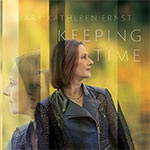KEEPING TIME • Mary Kathleen Ernst (pn) • INNOVA 868 (68:54)
 FUNG Keeping Time. HIGDON Secret and Glass Gardens. HOOVER Dream Dances. LUO Mosquito. SHATIN Chai Variations. DE KENESSEY Spontaneous D-Combustion. DEUSSEN A Recollection
FUNG Keeping Time. HIGDON Secret and Glass Gardens. HOOVER Dream Dances. LUO Mosquito. SHATIN Chai Variations. DE KENESSEY Spontaneous D-Combustion. DEUSSEN A Recollection
Perhaps the most notable aspect of this release, above and beyond the excellence of Ernst’s playing, is the stylistic diversity of the material. The program opens with Vivian Fung’s rapid-fire, almost minimalist homage to the gamelan, and continues with the chocolate-hued music of Jennifer Higdon. This is the first solo piano music of Higdon I have heard, and it impresses with its idiomatic grasp of the potential for intricate texture in a dense piano score. Katherine Hoover’s music, even when it is employing big gestures, is very economical. Every note counts. Dream Dances is an aptly descriptive title for the music, which is expressed in a lyrical, rhythmically alert flow. Jing Jing Luo breaks the mood with her agitated, and yes, highly whimsical flight of the mosquito, an insect that seems to fly much more erratically than a bumblebee. You get quite a bite at the end of the piece.
Judith Shatin’s music has been well received in the pages of this magazine, including by myself. I have commented on her strong ability to create a narrative pulse in her work, calling her a natural story teller. That quality is much in evidence in this large and compelling composition. Chai Variations takes its main theme from Jewish liturgical music (and its name from the Hebrew word for life). The brooding theme is followed by 18 variations, with such titles as “Yearning” and “Pensive,” reflecting differing aspects of the human condition, before settling back to the original theme.
Stefania de Kenessey dedicated her Spontaneous D-Combustion to Ernst. I wasn’t sure what to expect, given this rather snarky title, and was surprised by the sprightly three movement work (which she plans to expand into a concerto), which sounds inspired by popular American music from the early jazz age. Even the drawling molto tranquillo at the center seems to wear a quietly contented smile.
The program closes with a gentle, lovely short work by Nancy Bloomer Deussen that seems to reflect the personality of the performer. Mary Kathleen Ernst has many opportunities to dazzle the ear in this recital, and careful listening reveals a formidable virtuosity. But she seems to understand that her primary responsibility is to share the work of this excellent group of American women composers, making the honest and faithful expression of their music her utmost goal. As it should be. Peter Burwasser
